How Jeff Beck passed the Telecaster torch to Jimmy Page and changed the course of rock history
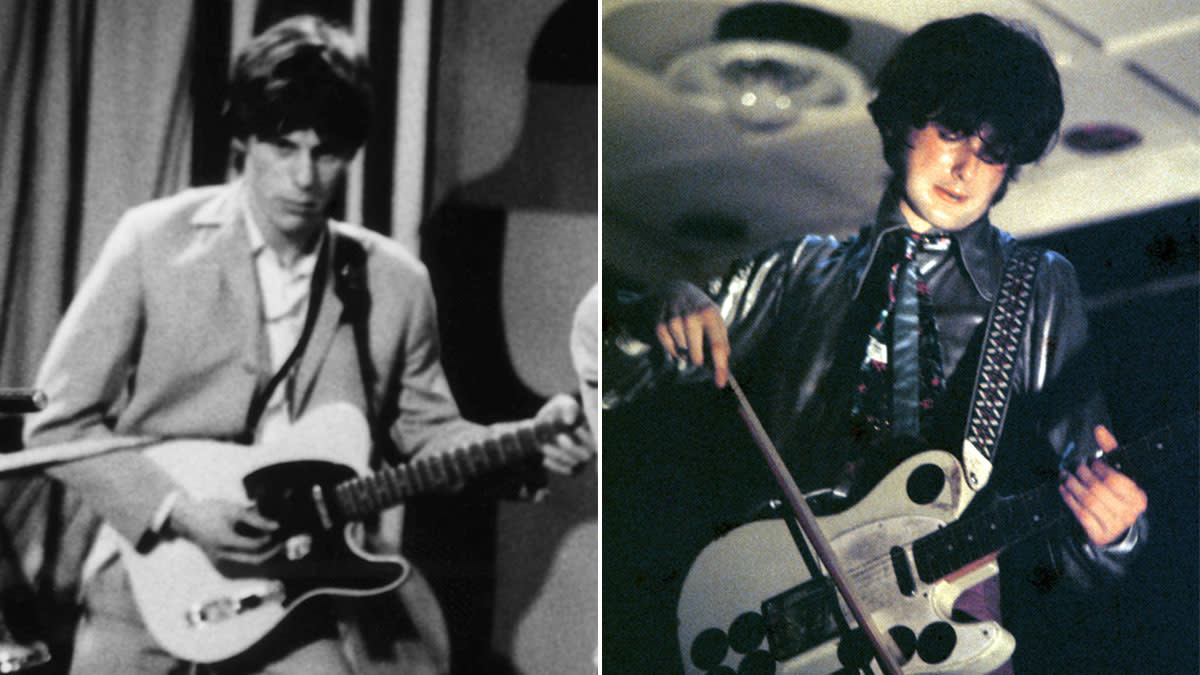
- Oops!Something went wrong.Please try again later.
- Oops!Something went wrong.Please try again later.
The friendship between Jimmy Page and Jeff Beck was enduring and genuine, and it is perhaps best summed up in the tale of a very special Fender Telecaster – one that saw use in the hands of both players and ran all the way from the Yardbirds through to Led Zeppelin.
The two players’ relationship was rooted from the beginning in the guitar. Beck’s sister was at art school in Epsom, London with Jimmy Page and saw the same burgeoning obsession in Page that she had noted in her brother.
“She came to my room one day. And said: ‘There’s a weirdo at school, he’s got a weird guitar like yours,’ and then slammed the door,” Beck told Louder in 2019. “I ran after her saying: ‘Where is he?’”
Fortunately for the fate of rock ‘n’ roll, Beck’s sister relented and took him to meet Page. “We both had homemade guitars [then], so we go back that far,” Page told Guitarist in 2014 (via MusicRadar). “When we’re seeing who’s got the closest version of My Babe by James Burton. Just two kids really enthusiastic and passionate about music and guitar playing.”
They soon became firm friends and during their teens would regularly meet to swap tips, share licks and record using a tape machine Page had been given by his mother.
In later years, Page found his way into the London studio scene and became a go-to gun-for-hire, learning much about production and arrangement in the process. In doing so, he also made a lot of connections, not least Giorgio Gomelsky, the manager of the Yardbirds – who repeatedly approached Page about joining the group.
However, the guitarist turned it down repeatedly – initially for fear of offending the band’s existing guitarist, Eric Clapton. When he was approached for a second time – in 1965, when Clapton had left the group – he recommended Gomelsky give Beck a call and, in doing so, made music history.
“[Beck] didn’t just replace Clapton,” wrote Alexis Petridis in The Guardian, following Beck’s passing. “He transformed the Yardbirds, from blues purists… to a band at the vanguard of British pop’s relentless forward progress. The first single he recorded with them, Heart Full of Soul… [saw] Beck mimicking the sound of sitar – some months before the Beatles first deployed the instrument on Norwegian Wood – with a guitar played through a distortion pedal called a Tone Bender.”
For his Yardbirds material, Jeff Beck initially used a red 1963 Fender Telecaster that was owned by Gomelsky and previously played by Clapton in the band – “a terrible guitar”, as he remarked to Tony Bacon in 2005 (via Reverb) for the book Six Decades of the Fender Telecaster. Instead, he soon acquired a 1959 Blonde Telecaster with a rosewood neck from a friend called John Owen.
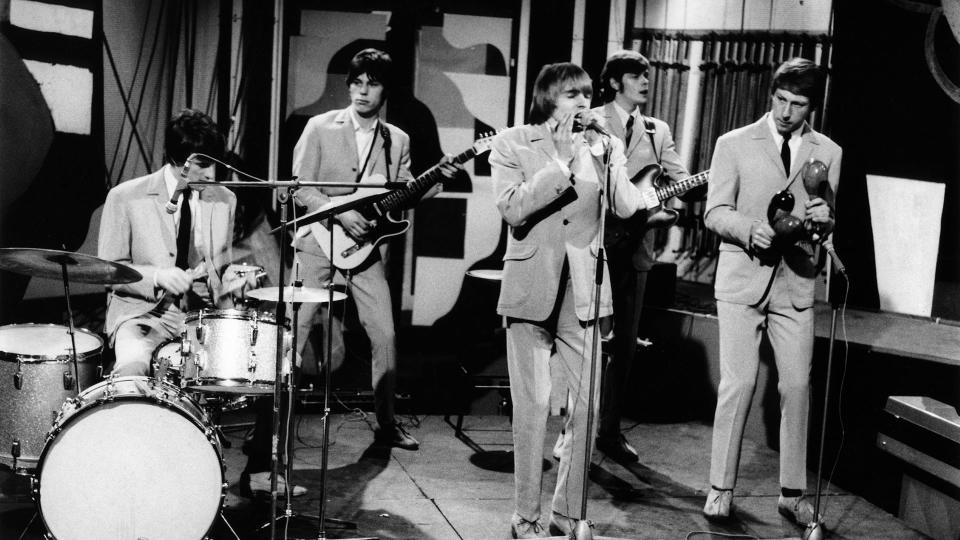
“A diamond geezer,” commented Beck. “A retired fire chief. He realized I could play better than him. I think that's what it was. I got him on [to] drums, because he wasn't very good on the guitar.”
Beck came to lean heavily on that Tele for his revelatory work with the Yardbirds. That same instrument would eventually pass to Jimmy Page, and when Fender produced a reissue of Jimmy Page’s iconic Telecaster in 2019, the guitar legend told he touching story of how it came into his possession.
“[I was] still living with my parents at the time in Epsom,” says Page in the animated promo clip [below]. “And I just heard this thing roaring up. I looked out the window and I saw that it was a Corvette Stingray outside… and Jeff's coming out and he's holding this guitar. [I thought] ‘Oh, he's come to have a play,’ you know?
“He knocks on the door and he's saying that they've just done a new deal and he bought the Stingray with it. He said, ‘Here, this is yours.’ And he gave me the Telecaster that he'd been using. He said, ‘This is yours for getting me in the Yardbirds.’ Well, obviously, I was really moved, you know – because there's a lot of love in that gesture of giving it to me.”
In 1966, Page was finally drafted into the Yardbirds – initially, stepping in to cover bass last minute and then taking on dual guitar duties with Beck for a short period.
Beck soon decided to leave the band, facing health issues and disenchantment with the heavy package tour schedule. Amusingly, though, for his part, Beck maintained in 2005 that he was misty on the detail of how the Tele changed hands.
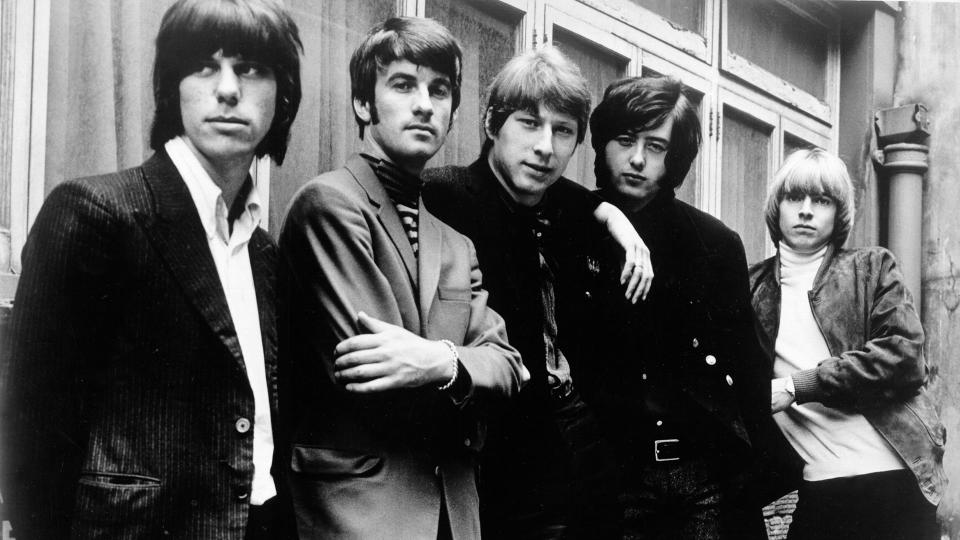
“The Tele that I got from John Owen somehow miraculously became Jimmy Page’s,” he told Bacon. “I don't know how. I left the Yardbirds in a huff – I just decided in a minute I was going to leave. So I didn't take the guitar, and Jimmy carried on playing, and because he was the only lead guitarist, he had to mimic what I did – that's how come he got the guitar. [Though] I've never actually explained that to John…”
Beck reportedly gave Owen a Fender Strat by way of recompense. Page, meanwhile, used the Tele in his time with the Yardbirds – where he first developed his technique of using the violin bow on electric guitar.
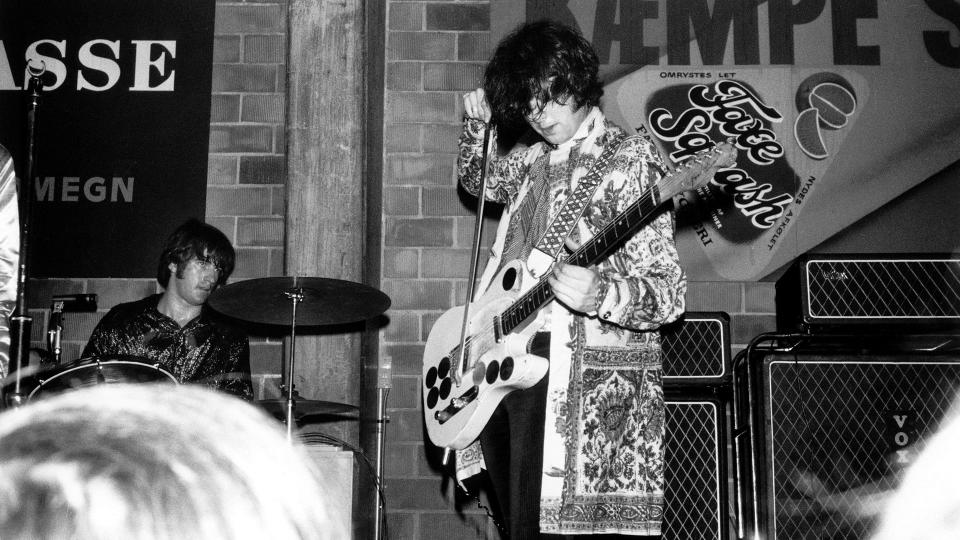
At the same time, he channeled his art school roots into its decoration, applying mirrors to reflect the stage lights, and later painting it with dragon artwork. “I wanted to consecrate the guitar,” he told Fender, in 2019. “To really make it my own.”
The Yardbirds petered out in 1968, at which point Page saw the opportunity to put his own band together. Again, Beck had something of a hand, as the early template for the group was arguably set when Page and fellow studio pro John Paul Jones helped record Jeff Beck’s signature tune, Beck’s Bolero – for 1968 album Truth – featuring Keith Moon on drums.
Led Zeppelin was born soon after and throughout its inception, Page leaned on the Tele that Beck had so generously gifted him.
“I could see what way it ought to go at that point,” Page told Fender. “Something that was radical at that time that involved acoustic and electric guitars, and this orchestration of the guitars.
“The whole [Led Zeppelin I] album is done in 30 hours. And the Telecaster is employed all the way through that album. And it's just a little [Supro Coronado] amp that I'm using, and the overdrive box, and a wah-wah pedal at times. But it just goes to show the versatility of the Telecaster and what could be achieved with the minimal amount of equipment.”
The Tele was utterly central to that energetic first record, and therefore used to record Page’s most spirited, colorful and exhuburant performances. Just listen to it erupt in the slash ’n’ burn solo of Good Times, Bad Times, caterwaul across Babe I’m Gonna Leave You and crunching through that Communication Breakdown riff.
Years later, when it came time to record Page’s defining solo – the extended lead section in Stairway To Heaven – it was again the Tele that he turned to. Page used it to start a journey to a level of success that was, at that point, unheard of in rock music.
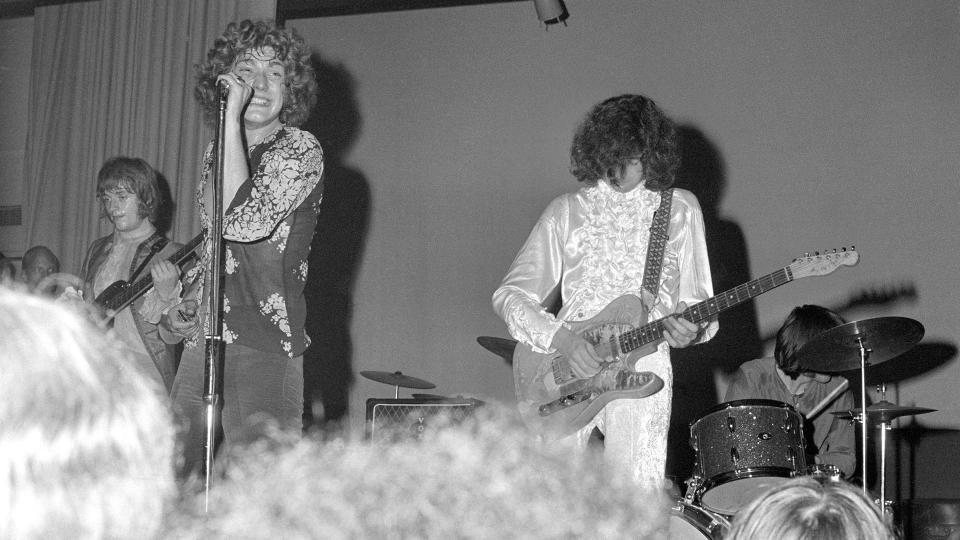
Beck did not enjoy the same astronomical ascendence – who did? But, in turn, he remained generously spirited.
“When I first heard what he’d done with Led Zeppelin, I thought: ‘That’s a little bit more than inspired by the Truth album,’” he admitted to Louder in 2019. “When I finally got over that I realized I needed more than I had. I needed a frontman with girly appeal. Plant certainly had that in abundance – the bare chest, golden locks and all that. We had Rod Stewart!”
As for the Tele, it has remained in Page’s possession ever since and, in an alternative 2019 video from Fender [above], you can see how much the guitar still means to him – he appears visibly emotional in telling its story. We can only imagine the sentiment it holds following Beck’s passing.
In 2005, Beck acknowledged its importance to Page, albeit with his trademark deprecation.
“He knows what it meant,” he told Bacon. “He in turn gave me a Maccaferri [an acoustic brand built by Selmer for a 20-year period from 1932] for a birthday present. A plastic Maccaferri. And I went, ‘Oh, nice one, Jim.’ It had a thing with it that said: ‘To keep your guitar in tip-top condition use a damp cloth.’
“I thought, ‘Oh dear…’ But I've never stopped playing it! It's the most incredible, great-sounding guitar, and I didn't like it at first. A kind of cheapo Django thing, but great. So he’s kind of justified having my Tele for so many years.”

Having been its guardian for so long, Page arguably deserves the final word on the Tele, though.
“This guitar, it's so special,” he told Fender. “It's got such a history to it… It's given to me by Jeff, but it's got a journey like I've got a journey, too. That journey of that guitar is pretty extraordinary stuff. Indeed, it's that magical Telecaster, isn't it?”

